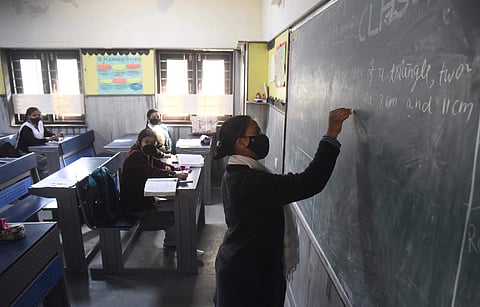

As we await the results for CBSE Class X and XII exams, several students from government schools (CBSE) in Delhi have requested the Delhi government to relieve them from paying the high fees for the academic year 2022-23. Some students have also been denied readmission to Class X despite paying the examination fee.
It may be recalled that in September 2021, the Delhi government requested the CBSE to waive off the examination fees as a one-time measure for Class X and XII students (for the 2021-22 academic session) studying in Delhi government and government-aided schools, among others, citing the pandemic-induced financial crisis. However, there was no proposal by the CBSE in this regard. In 2019, CBSE hiked the board examination fee for Class X and XII students in the general category in Delhi government schools from ₹375 and ₹600, respectively, to ₹1,500 for five subjects.
Advocate Ashok Agarwal, who also represents the Social Jurist Non-Governmental Organisation (NGO), pointed out that poor students are being left out of the academic system as they are not able to afford the CBSE fees. “The fees come up to more than Rs 1800. If the students could afford this then they would have gone to private schools,” said Agarwal.
A Class X student, Divya said, “The fee is Rs 1850 and I cannot afford this because my dad doesn’t go to work and my mom works in Koti. There are seven people who eat food in my house so I cannot pay the fees. Government please relieve me from paying the fees,” in a post on Twitter shared by Agarwal.
The Right to Education (RTE) Act, 2009 guarantees free and compulsory education to all children between the age group of six to 14 years. However, these students who have been requesting relief in the exam fees, are not covered under this provision as they are above the required age group. “The government should help them in spite of this as they are first-generation learners in a government school,” said Agarwal.
Additionally, another student, Sameer of Class X was denied readmission to Government Boys Senior Secondary School Samalkha even though he paid the exam fees, according to Agarwal. He failed as he couldn’t appear for the exam because he had to go to his village but he still cannot be denied readmission legally, said Agarwal.
Highlighting other issues that children in government schools are facing, Agarwal also pointed out that nearly 50 students were facing the problem of being allotted a school that is far from their residence. “That parents of all these children informed me that they are daily wage labourers and do not have means to admit their wards in nearby private school nor do they have means to hire a private vehicle for daily transportation of their wards to school. Therefore, they want that their wards should be shifted to school at Samalka near their residence,” said Agarwal in a letter addressed to the Delhi Chief Minister.
Nand Kishore, parent of Drishti, who is studying in Class VII said that they face a lot of difficulty in ensuring that their child reaches school. “The school is 10 km away from the house. How will we do our duty and job and also ensure that she reaches school safely,” he said. Parents said that if their children cannot be shifted to nearby schools, then they should at least provide transportation at a free cost otherwise they will have to withdraw their name from schools which could increase the number of children who are out of school.
Agarwal also pointed out that such kinds of problems are leading to a rise in dropouts from government schools. According to a survey conducted by the National Statistical Office (NSO) around 12.6% of students dropout of schools in India. Reports suggest that the reasons for dropping out vary from help in domestic work, economic conditions, lack of interest and sanitary problems as well. In fact, the Delhi High Court on Wednesday, July 6, directed the Delhi government to ensure an uninterrupted supply of sanitary napkins for students under the Kishori Yojana scheme at its schools. This order came after a petition was filed through Advocate Agarwal that the government had stopped the supply of sanitary napkins at schools since January 2021 on account of which the girls are facing problems.
